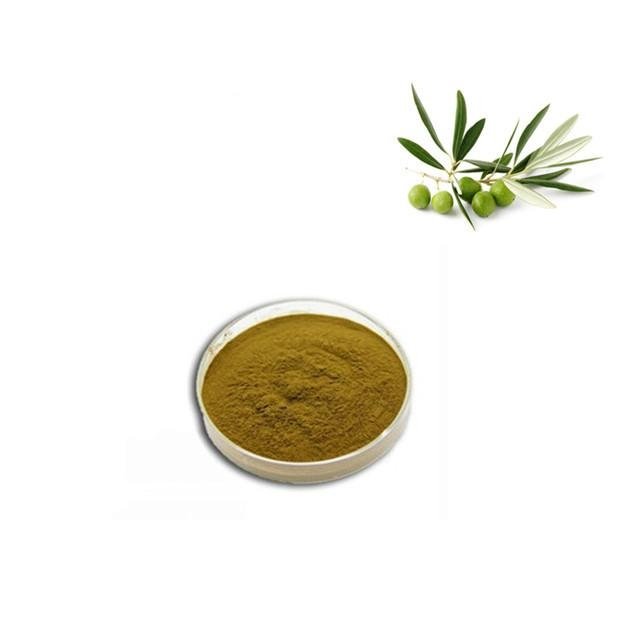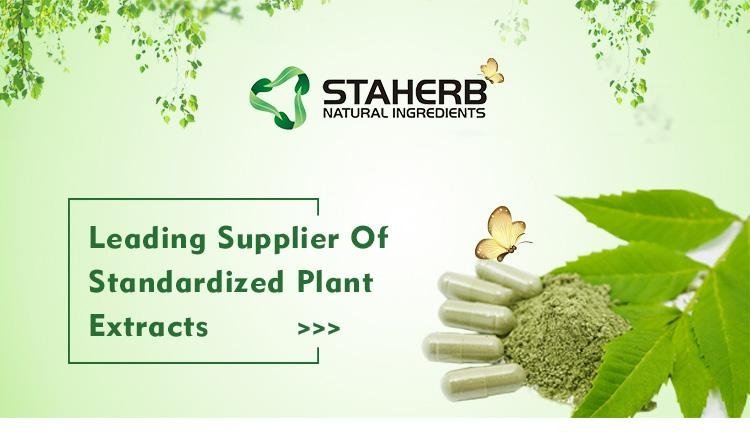
Olive leaf extract Oleuropein 40%
Product Origin: Extracted from the olive leaf
Used Part: leaf
Product Content: 10% 20% 30% HPLC
Effective ingredients: Oleuropein
Appearance: Brown Powder

Olive is oleaceae osmanthus fragrans lam evergreen trees, is a world famous woody oil plants and fruit with tree species, varieties have higher edible value, rich in high quality edible vegetable oil, olive oil, for the famous tropical fruit trees and important economic trees.
Olive for hardwood, leaves simple, opposite, flowers white, corolla 4, male and female 2, ovary 2 rooms, each room 2 ovules, stone fruit oil, oval.
Olive leaf is the leaf of the olive tree (Olea europaea). While olive leaf extract is well known for its health benefits, the leaf has been used medicinally in varioustimes and places.Natural
olive leaf and olive leaf extracts (OLE), are now marketed as anti-aging, immunostimulators, and even antibiotics. (olive leaf powder)
Olive leaf extract Function:
1. Olive extract is used in eliminating viruses;
2. Olive extract oleuropein can prevent the hardening of the arteries;
3. As a important medical raws, Olive extract can be used to lower blood pressure;
4. As an effective antioxidant, Olive extract can prevent hardening of the arteries;
5. Olive extract can increase blood flow in the coronary arteries,relieve arrhythmias;
6. In enhancing immunity and improving the autoimmune disorder;
7. Olive extract is used for anti-diabetes.anti-virus, anti-bacteria, anti-fungi, and anti-protozoa.
Olive leaf extract Application:
Used in beauty products and health products, can effectively enhance the skin elasticity and moist, anti-wrinkle with the effect of anti-aging.
For more product information pls kindly contact email sales09@staherb.cn
Specifiction
| Items |
Standards |
Results |
| Physical Analysis |
||
| Description |
Brown Yellow Powder | Complies |
| Assay |
Oleuropein 40% (HPLC) | 40.3% |
| Mesh Size |
100 % pass 80 mesh | Complies |
| Ash |
≤ 5.0% | 2.85% |
| Loss on Drying |
≤ 5.0% | 2.65% |
| Chemical Analysis |
||
| Heavy Metal |
≤ 10.0 mg/kg | Complies |
| Pb |
≤ 2.0 mg/kg | Complies |
| As |
≤ 1.0 mg/kg | Complies |
| Hg |
≤ 0.1mg/kg | Complies |
| Microbiological Analysis |
||
| Residue of Pesticide |
Negative | Negative |
| Total Plate Count |
≤ 1000cfu/g | Complies |
| Yeast&Mold |
≤ 100cfu/g | Complies |
| E.coil |
Negative |
Negative |
| Salmonella |
Negative |
Negative |
References
- 1.
González-Correa JA, Muñoz-Marín J, Arrebola MM, Guerrero A, Narbona F, López-Villodres JA, De La Cruz JP (2007) Dietary virgin olive oil reduces oxidative stress and cellular damage in rat brain slices subjected to hypoxia–reoxygenation. Lipids 42(10):921–929
- 2.
González-Correa JA, Navas MD, Lopez-Villodres JA, Trujillo M, Espartero JL, De La Cruz JP (2008) Neuroprotective effect of hydroxytyrosol and hydroxytyrosol acetate in rat brain slices subjected to hypoxia–reoxygenation. Neurosci Lett 446(2):143–146
- 3.
Kuem N, Song SJ, Yu R, Yun JW, Park T (2014) Oleuropein attenuates visceral adiposity in high-fat diet-induced obese mice through the modulation of WNT10b- and galanin-mediated signalings. Mol Nutr Food Res 58(11):2166–2176
- 4.
Dekanski D, Selaković V, Piperski V, Radulović Ž, Korenić A, Radenović L (2011) Protective effect of olive leaf extract on hippocampal injury induced by transient global cerebral ischemia and reperfusion in Mongolian gerbils. Phytomedicine 18(13):1137–1143
- 5.
Bu Y, Rho S, Kim J, Kim MY, Lee DH, Kim SY, Choi H, Kim H (2007) Neuroprotective effect of tyrosol on transient focal cerebral ischemia in rats. Neurosci Lett 414(3):218–221
- 6.
Mohagheghi F, Bigdeli MR, Rasoulian B, Zeinanloo AA, Khoshbaten A (2010) Dietary virgin olive oil reduces blood brain barrier permeability, brain edema, and brain injury in rats subjected to ischemia-reperfusion. Sci World J 10:1180–1191
- 7.
De La Cruz JP, Del Río S, Arrebola MM, López-Villodres JA, Jebrouni N, González-Correa JA (2010) Effect of virgin olive oil plus acetylsalicylic acid on brain slices damage after hypoxia-reoxygenation in rats with type 1-like diabetes mellitus. Neurosci Lett 471(2):89–93
- 8.
Pitozzi V, Jacomelli M, Zaid M, Luceri C, Bigagli E, Lodovici M, Ghelardini C, Vivoli E, Norcini M, Gianfriddo M, Esposto S (2010) Effects of dietary extra-virgin olive oil on behaviour and brain biochemical parameters in ageing rats. Br J Nutr 103(11):1674–1683
- 9.
Zare L, Esmaeili-Mahani S, Abbasnejad M, Rasoulian B, Sheibani V, Sahraei H, Kaeidi A (2012) Oleuropein, chief constituent of olive leaf extract, prevents the development of antinociceptive tolerance through inhibition of -induced L-type calcium channel overexpression. Phytother Res 26(11):1731–1737
- 10.
Esmaeili Mahani S, Zare L (2013) Olive (Olea europaea L.) leaf extract and its main component (oleuropein) mitigate the development of physical dependence in rats. Physiol Pharmacol 16(4):360–370
- 11.
Lauretti GR, Ahmad I, Pleuvry BJ (1994) The activity of analgesics in seizure models utilizing N-methyl-DL-aspartic acid, kainic acid, bicuculline and pentylenetetrazole. Neuropharmacology 33(2):155–160
- 12.
Foote F, Gale K (1984) Proconvulsant effect of on seizures induced by pentylenetetrazol in the rat. Eur J Pharmacol 105(1):179–184
- 13.
Homayoun H, Khavandgar S, Namiranian K, Gaskari SA, Dehpour AR (2002) The role of nitric oxide in anticonvulsant and proconvulsant effects of in mice. Epilepsy Res 48(1):33–41
- 14.
Khavandgar S, Homayoun H, Dehpour AR (2003) Mediation of nitric oxide in inhibitory effect of against electroshock-induced convulsions in mice. Pharmacol Biochem Behav 74(4):795–801
- 15.
de la Puerta R, Domínguez ME, RuÍz-GutÍerrez V, Flavill JA, Hoult JR (2001) Effects of virgin olive oil phenolics on scavenging of reactive nitrogen species and upon nitrergic neurotransmission. Life Sci 69(10):1213–1222
- 16.
Visioli F, Galli C (1994) Oleuropein protects low density lipoprotein from oxidation. Life Sci 55(24):1965–1971
- 17.
Visioli F, Bellosta S, Galli C (1998) Oleuropein, the bitter principle of olives, enhances nitric oxide production by mouse macrophages. Life Sci 62(6):541–546
- 18.
Visioli F, Poli A, Gall C (2002) Antioxidant and other biological activities of phenols from olives and olive oil. Med Res Rev 22(1):65–75
- 19.
Honar H, Riazi K, Homayoun H, Demehri S, Dehghani M, Vafaie K, Ebrahimkhani MR, Rashidi N, Gaskari SA, Dehpour AR (2004) Lithium inhibits the modulatory effects of on susceptibility to pentylenetetrazole-induced clonic seizure in mice: involvement of a nitric oxide pathway. Brain Res 1029(1):48–55
- 20.
Majewska MD, Bell JA, London ED (1990) Regulation of the NMDA receptor by redox phenomena: inhibitory role of ascorbate. Brain Res 537(1):328–332
- 21.
Park S, Choi Y, Um SJ, Yoon SK, Park T (2011) Oleuropein attenuates hepatic steatosis induced by high-fat diet in mice. J Hepatol 54(5):984–993
- 22.
Shafaroodi H, Baradaran N, Moezi L, Dehpour S, Kabiri T, Dehpour AR (2011) sensitization in the pentylenetetrazole-induced clonic seizure threshold in mice: role of nitric oxide and μ receptors. Epilepsy Behav 20(4):602–606
- 23.
Rahimi N, Sadeghzadeh M, Javadi-Paydar M, Heidary MR, Jazaeri F, Dehpour AR (2014) Effects of D-penicillamine on pentylenetetrazole-induced seizures in mice: involvement of nitric oxide/NMDA pathways. Epilepsy Behav 39:42–47
- 24.
Tsikas D (2007) Analysis of nitrite and nitrate in biological fluids by assays based on the Griess reaction: appraisal of the Griess reaction in the L-arginine/nitric oxide area of research. J Chromatogr 851(1):51–70
- 25.
Del Vecchio RA, Gold LH, Novick SJ, Wong G, Hyde LA (2004) Increased seizure threshold and severity in young transgenic CRND8 mice. Neurosci Lett 367(2):164–167
- 26.
Luccarini I, Grossi C, Rigacci S, Coppi E, Pugliese AM, Pantano D, Casamenti F (2015) Oleuropein aglycone protects against pyroglutamylated-3 amyloid-β toxicity: biochemical, epigenetic and functional correlates. Neurobiol Aging 36(2):648–663
- 27.
Mohagheghi F, Bigdeli MR, Rasoulian B, Hashemi P, Pour MR (2011) The neuroprotective effect of olive leaf extract is related to improved blood–brain barrier permeability and brain edema in rat with experimental focal cerebral ischemia. Phytomedicine 18(2):170–175
- 28.
Rauwald HW, Brehm O, Odenthal KP (1994) Screening of nine vasoactive medicinal plants for their possible calcium antagonistic activity. Strategy of selection and isolation for the active principles of Olea europaea and Peucedanum ostruthium. Phytother Res 8(3):135–140
- 29.
Wang L, Geng C, Jiang L, Gong D, Liu D, Yoshimura H, Zhong L (2008) The anti-atherosclerotic effect of olive leaf extract is related to suppressed inflammatory response in rabbits with experimental atherosclerosis. Euro J Nutr 47(5):235–243
- 30.
Cullinen K (2006) Olive oil in the treatment of hypercholesterolemia. Med Health RI 89(3):113
- 31.
Owen RW, Giacosa A, Hull WE, Haubner R, Würtele G, Spiegelhalder B, Bartsch H (2000) Olive-oil consumption and health: the possible role of antioxidants. Lancet Oncol 1(2):107–112
- 32.
Ueda S, Tokuda H, Iwashima A, Nishino H (1994) Chemoprevention of skin and lung cancer by Gardenia iridoid. In: Proceedings International Congress on Natural Products Research
- 33.
Nekooeian AA, Khalili A, Khosravi MB (2014) Effects of oleuropein in rats with simultaneous type 2 diabetes and renal hypertension: a study of antihypertensive mechanisms. J Asian Nat Prod Res 16(9):953–962
- 34.
Sardo P, D’Agostino S, Rizzo V, Carletti F, Lonobile G, Ferraro G (2009) In the rat maximal dentate activation model of partial complex epilepsy, the anticonvulsant activity of levetiracetam is modulated by nitric oxide-active drugs. J Neural Transm 116:831–839
- 35.
Javadian N, Rahimi N, Javadi-Paydar M, Doustimotlagh A, Dehpour AR (2016) The modulatory effect of nitric oxide in pro- and anti-convulsive effects of vasopressin in PTZ-induced seizures threshold in mice. Epilepsy Res 126:134–140